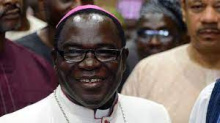African Climate Week and Africa Climate Summit’s Statement of Faith
Statement of Faith from around the African continent to the Kenyan government, the African Union and the United Nations Framework Convention on Climate Change at the African Climate Summit and the African Climate Week, Nairobi, Kenya 4th - 6th September 2023
We, faith leaders, representing the diverse and united voices of African multi-faith leaders, come together at the Africa Climate Summit and Week with a shared conviction and a solemn responsibility. Our lands, our waters, our air, and myriad life forms they sustain are sacred gifts bestowed upon us by the Divine. Today, however, we stand at a crossroads in history, a moment of unprecedented challenge where the very fabric of creation is threatened by the heedless actions of humanity and the quest to profit from creation.
When climate disasters strike, it is often the faithful who respond with open hearts and helping hands. It is our churches, mosques and temples that become safe havens and new homes for the displaced.
As guardians of spiritual wisdom and moral guidance we are disheartened by how actions to tackle climate change fall short of the required urgent ambition. The time for more ambitious Political leaders, communities and ourselves must heed the cries of the earth and the loud cries of those most affected by its changing climate. Our sacred teachings demand that we be responsible for creation. The values of stewardship, empathy, justice, equity and solidarity as enshrined in our faith traditions must guide every decision and action that is taken at the Africa Climate Summit and Week.
We urge our governments and all those represented in the Africa Climate Summit and Week to be guided by the wisdom of our faith traditions and the undeniable urgency of the moment. The faith constituency is deeply concerned by actions that fall short of the required ambition in tackling the climate emergency which threatens life on earth. We must leverage this momentum to deliver concrete actions that will help the continent address the challenges of the climate crisis. It is now more than ever before that our governments must prioritise policies that honour our planet and its biodiversity, that promote sustainable land practices, that mitigate the effects of climate change on the most vulnerable among us, and that deliver adequate and predictable climate finance to where it is most needed.
Recognizing the hosting of the 1st ever Climate Summit in Africa, a continent with special needs and circumstances, and the intended final outcome of the Africa Climate Summit dubbed “Nairobi Declaration on a new Financial Architecture” the faith communities would like to bring to your attention the following demands.
Together, we authenticate that:
We all have a duty and a responsibility to protect, respect and sustain all forms of life that God has accorded to us on this earth.In his Encyclical Laudato Si (2015), Pope Francis offered the world a moral compass with which to urgently address the looming dangers that threaten our environment. He warned that: We are the first generation to feel the impact of climate change and the last generation that can do something about it. As faith leaders in Africa, we believe that each one of us can respond to this challenge. We therefore call on
 religious leaders to build bridges of friendship and reverse the new surge of religious extremisms which are destroying the foundations of our faiths and destroying our people.
religious leaders to build bridges of friendship and reverse the new surge of religious extremisms which are destroying the foundations of our faiths and destroying our people.
Therefore:
- Africa Climate Summit and the African Climate Week is a timely moment for leaders to move beyond rhetoric, demonstrate our collective resolve and unwavering solidarity to safeguard the earth for current and future generations. . We amplify the following as matters central to the African region that must be considered
1. Climate Finance
While we call on the international community to meet up its financial obligations to Africa, we believe that African leaders must become more transparent in the judicious use of their resources towards improving the quality of lives of their citizens. African leaders must take steps to reverse the haemorrhaging of financial resources from the continent to the western world.We are cognizant of the fact that there has not been adequate financial support directed to the African continent despite efforts and commitments from the developed countries to avail the same. The African Climate Summit presents an opportunity for developed countries, who have contributed the most to the climate crisis,to move beyond rhetoric and deliver on the long due finance. We acknowledge that the global financial architecture features various injustices and practices that increasingly marginalised poor and vulnerable nations.
Therefore, we call on:
- all actors, including societal leaders, and citizens of the world put pressure on states and financial institutions, particularly those that determine the rules of engagement within the global financial architecture, to urgently re-purpose the architecture. This architecture must be equitable to all, foster low carbon climate resilient growth, release fair and affordable forms of finance and support green and inclusive growth.
- Global North leaders to move past announcements, to delivery on commitments made.
We urge the African leaders to:
- Adopting a roadmap of ensuring that climate finance is delivered reaches the most vulnerable and marginalised frontline communities that are at the highest risk of the climate crisis.
2. Loss and Damage
According to the IPCC report, Africa is anticipated to be confronted with the severest adverse effects of human-induced climate change, compared to most other regions of the world due to a relatively low adaptive capacity.1 Africa has contributed in negligible amounts about three to four percent of the global greenhouse gas emissions.
- Jointly call for the operationalization, including capitalization by rich countries, of the loss and damage fund to offer relief to Global South countries through provision of grant financing for addressing loss and damage

- (IPCC AR4, World Bank 2022)
 Call for equity and fairness of finance provided by global financial institutions to poor countries suffering losses and damages
Call for equity and fairness of finance provided by global financial institutions to poor countries suffering losses and damages
3. Youth and Green Jobs
We recognise that many of the continent’s increasing population of working-age youth are unable to find decent work in Africa’s steadily expanding economies afflicted by ‘jobless growth’.2
We call upon the African leaders to:
- Adopt a plan of action with robust policy and regulatory measures necessary for African countries to implement and support the growth of inclusive green economies that can provide jobs for the youth.
- Support research and innovation to advance greener economic diversification and growth growth
● Initiate strategies that facilitate development of financial solutions and packages that are accessible and affordable to youth green enterprises including by leveraging climate finance.
4. Adaptation
We urge the African Climate Week to have clear implementation plans on the strengthening of adaptation actions and resilience against the consequences of the climate crisis as one of its core outcomes.
We urge the African leaders to:
- Adopt a concrete, science and evidence based approach to planning and
implementing adaptation actions that respond to the adaptation needs of communities,
- Enhance adaptation efforts by calling for the operationalisation of the Global Goal on Adaptation (GGA)
- Catalyse the increase of finance for adaptation in Africa through exploring of different finance avenues that deliver fair and low cost finance for adaptation to African countries and communities
5. Fossil Fuel Phase out and Supporting Renewable energy access
We recognise that access to energy is a fundamental challenge that the African continent is facing even after the extraction of the strategic resources needed to transform the continent.
We urge the African leaders to:
- Divest away from fossil fuels energy sources (oil, gas and coal) and set clear climate targets and necessary actions needed to actualise the divestment
- Operationalise a fair and just transition to clean energy sources that are affordable, efficient and accessible for our communities.
6. Agriculture, Food Security and Sovereignty

 African countries continue to face high levels of famine and malnutrition despite the vastness of its arable land. Chronic and acute malnutrition, particularly among children, remains a grave concern.
African countries continue to face high levels of famine and malnutrition despite the vastness of its arable land. Chronic and acute malnutrition, particularly among children, remains a grave concern.
We urge African leaders to:
- Recognize the structural traps that have undermined Africa’s agricultural potential and compromise capabilities to build adaptive agricultural capacities.
- Prioritise climate change coping strategies featured in various agricultural methods such as agroecology, conservation and adaptive agriculture to strengthen agriculture in Africa
- Promote food security and sovereignty which is the right of the African people to control their own food systems. This includes supporting small-scale farmers, promoting local food systems, and ensuring that agricultural policies prioritise and protect local communities and the environment.
- Recognize the critical role small-holder farmers play in providing food and protecting our environment.
With faith as our moral compass, love and dignity as our guiding light, let us all stand shoulder to shoulder, hand in hand, in our shared pursuit of a just, equitable and sustainable world. Together, we have the power to restore what has been destroyed, to heal what has been wounded, and to nurture Mother Earth that sustains us all.
END



